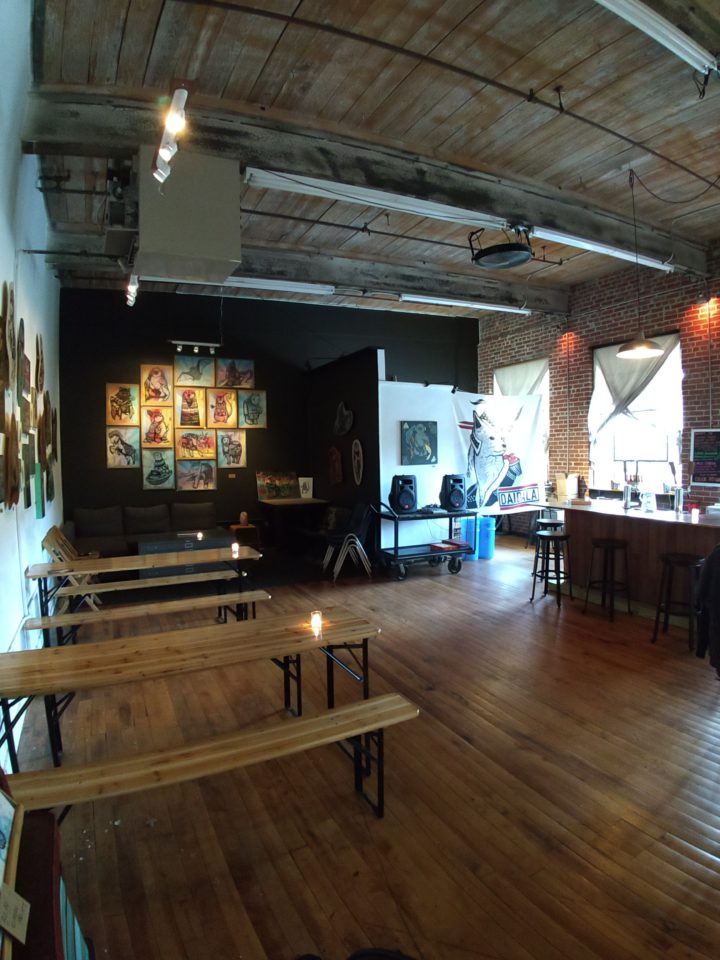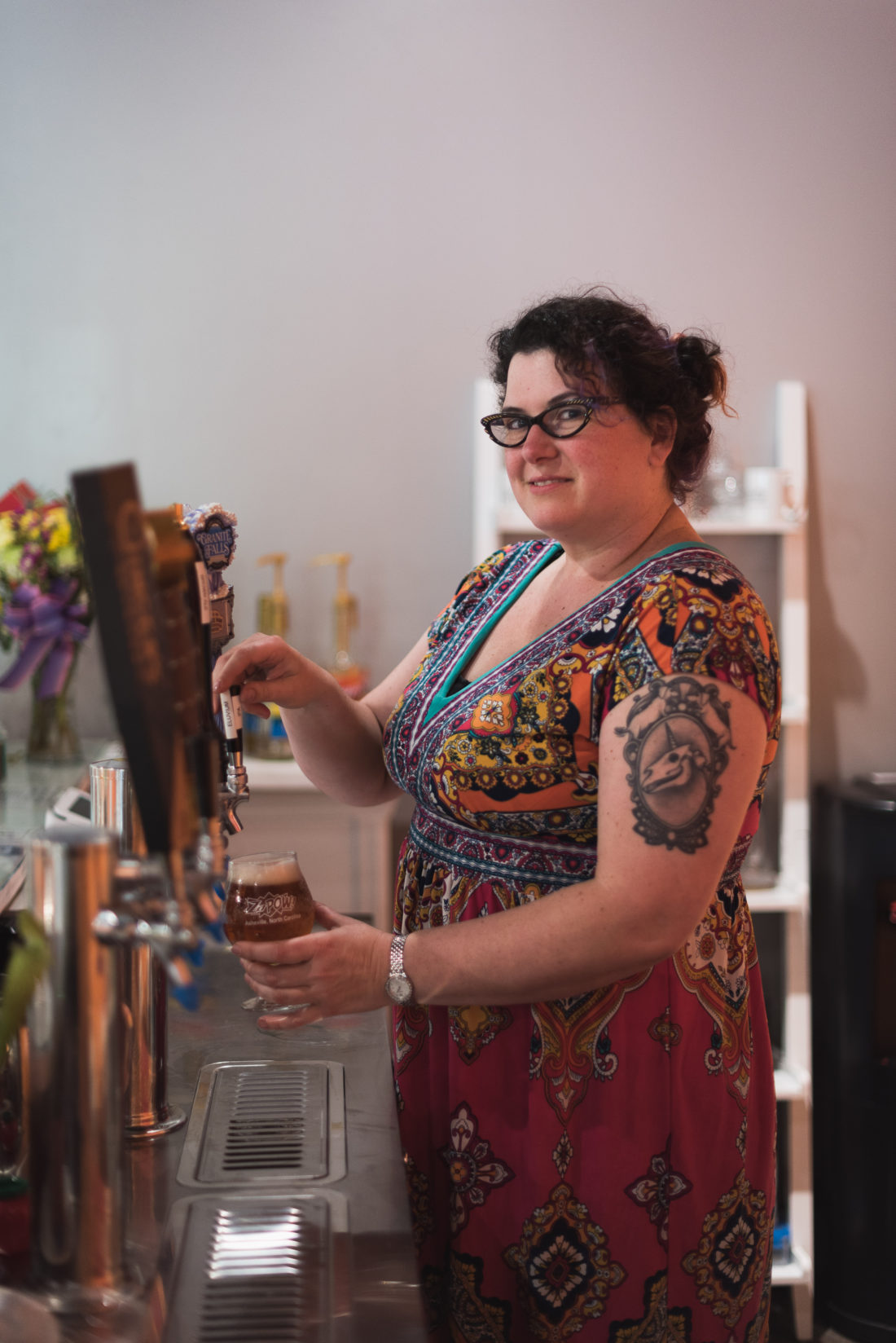It’s no secret that Asheville’s reputation has been built, at least in part, on its art scene and its fascination with craft beer, liquor — and now wine, as evidenced by the recent opening of plēb urban winery. But if an arts-focused business wants to boost sales, is adding booze a simple solution? (Not that dealing with alcohol permits could ever be called simple.) Many local entrepreneurs have bet on art-plus-booze being a winning formula, but has it paid off?
Chris Heagney, the cidermaker behind Daidala Ciders, thinks so. “We both have certainly benefited from being exposed to two different spheres — art and craft beverage,” he says. The other half of that “we” is Andy Herod, who operates a gallery in Cotton Mill Studios. The two converted Herod’s space into a gallery taproom in April, opting to permanently co-exist as two makers selling their own wares.
“There’s paint splattered on our tables, and the bar is covered with Andy’s designs. I think it makes the experience more intriguing for people who come in and feel like they’re being welcomed into our personal space,” Heagney says.
Before this partnership, Daidala Ciders was sold only in stores, but now, the gallery allows him a place “to connect with customers and have a location to showcase all the different styles of cider I make,” he says. The timing also helped Herod, who had an opportunity to go to Los Angeles for a few months for a music project but didn’t want to give up his studio or close it for so long.

Although Heagney is thrilled with the partnership, he admits it’s not easy to convey the concept to others. “It takes more than just a simple word or phrase such as ‘cocktail bar’ or ‘art studio’ to describe the experience here,” Heagney says. “And some people come to seek out Andy’s art and are surprised to see a bar sitting in the middle of the studio, or customers show up for a cider and are blown away by the artwork covering the walls.”
For Lauren DeWorde, owner of ZaPow! Gallery, the reason for adding beer and coffee centers around expanding inclusivity. “Due to the defunding of arts funding nationwide and the defamation of intellectualism, many contemporary Americans that are visiting Asheville for beer do not feel welcome in a physical space labeled strictly as an art gallery,” she says.
The additions have also transformed ZaPow! into a place where laptop warriors now sit and work by day and a cultural hub for groups like the Asheville Writers meet-up. “Now, we can welcome more bodies through our doors,” she says. “Once they step into ZaPow!, we can begin the dialog of valuing art not only as a purchase but also as a critical aspect of society.”
However, DeWorde doesn’t think that adding booze automatically amounts to a winning formula for an art-centric business. “Just doing what we are doing would not be anything new,” she says. “I think every business could improve by addressing their community’s needs with creative and fresh solutions.”
And while getting a license to sell alcohol came with a lot of red tape, she assures that “it’s no horror story.” In fact, the new revenue stream helps her keep fees for artists low while supporting her goal of becoming “a true worker-owner cooperative with a healthy bottom line.”
Inspired by the corporate ideology of CVS, which she deems “one of the most inspiring businesses in contemporary America,” DeWorde strives to keep ZaPow! ever-changing. “The ZaPow! of five years from now will not be the same as the ZaPow! of today. We grow. We change. We thrive,” she says.
At Lexington Glassworks, the art has been and always will be top priority, but owners Billy Guilford and Geoff Koslow added a small bar with four beer taps in 2016. “We certainly don’t rely on bar sales to bring people in the door; it’s more of a nice surprise to our clients — most people don’t realize that we have a bar,” says marketing director Ashleigh Hardes.
And while the bar might not be the main draw for individual consumers, it does help attract interest in the gallery’s dozen or so annual events, which include pop-ups, concerts, networking evenings and the popular Glassworks Concert Series and Annual Limited Edition Ornament Release Party. “The small beer bar lends itself well to these types of events, and we are able to join forces with local breweries to offer the ultimate Asheville experience — art, beer and music all in one place,” Hardes says.
The gallery is also rented out for a few private events each year, and Hardes is happy to report that so far, no problems have arisen from mixing beer and delicate glasswork. “Most people are respectful and very mindful of the space,” she says.
Like Lexington Glassworks, Asheville Pinball Museum doesn’t play up the fact that it sells beer, opting to keep its collection of pinball machines the primary focus. “Only roughly 10 percent of our sales would be beer,” explains owner T.C. DiBella. “But we sell beer because, for many of the old-school players, playing pinball and having a beer goes hand in hand.” Spills have been minimal, and like his contemporaries, DiBella doesn’t stay open late, which helps in avoiding rowdy crowds.
He does note that alcohol can be a turn-off for some people at certain venues, and he works to convey a family-friendly vibe. “We think of ours as a nice bonus,” he says. “We don’t even advertise that we sell beer and don’t have any signage in the museum besides a small wooden sign from Asheville Brewing.”
With attendance at the museum having risen nearly every week for the past five years, DiBella isn’t worried about ramping up alcohol sales anytime soon. And Heagney, for one, doesn’t think adding alcohol is necessarily the answer for boosting the bottom line for all businesses. “Serving beer, wine or cider will certainly keep folks hanging around your space for a longer period of time,” he says, “but I don’t think that offering alcohol will automatically improve sales.”



Before you comment
The comments section is here to provide a platform for civil dialogue on the issues we face together as a local community. Xpress is committed to offering this platform for all voices, but when the tone of the discussion gets nasty or strays off topic, we believe many people choose not to participate. Xpress editors are determined to moderate comments to ensure a constructive interchange is maintained. All comments judged not to be in keeping with the spirit of civil discourse will be removed and repeat violators will be banned. See here for our terms of service. Thank you for being part of this effort to promote respectful discussion.